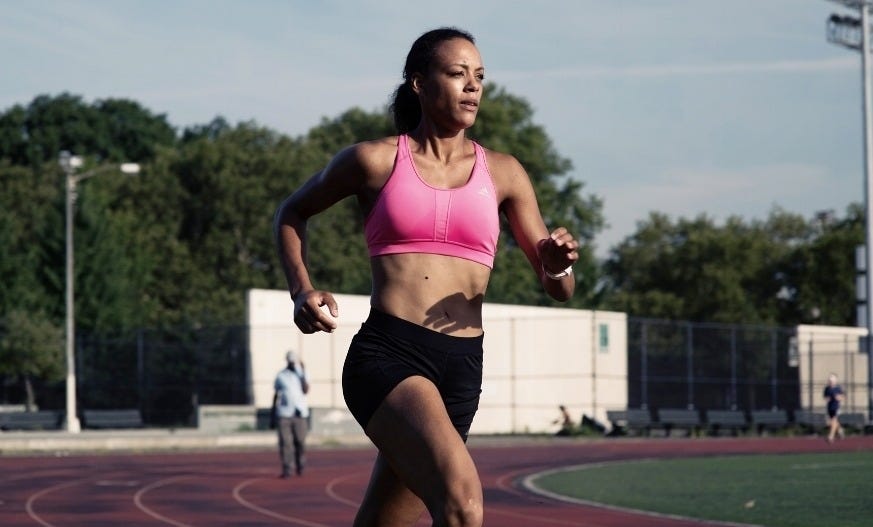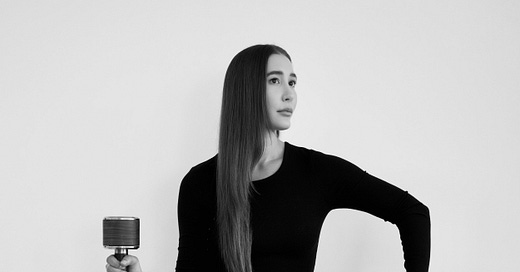Longevity is kind of a big deal. What expert tips are ‘doable’ for aging well?
Learn from Midi CEO Joanna Strober, Kayla Barnes, Dr. Julie Fratantoni, Aja Campbell, Dr. Matt Walker, and Roma Van der Walt.
MVP longevity tips from people who walk the talk
Because longevity is trending, but not always in a good way
By
From biohackers chasing 150-year lifespans to influencers selling mushroom powders and IV drips, the internet is full of longevity “experts” promising to slow down aging — if you just subscribe, inject, or buy now. At The Midst, we’re not here for the BS. We’re here for what actually works — and more importantly, what makes life feel worth living as we age.
The topic of longevity hits close to home for many of us who are caregiving for aging parents while also navigating our own midlife health shifts. We’re wondering: how do we age well, not just longer? What does it mean to invest in your future self in a way that’s sustainable, joyful, and attainable?
We’re asking these questions at a time when the U.S. population is older than ever. The number of Americans 65+ is projected to rise from 58 million in 2022 to 82 million by 2050 — a 47% increase. Between 1980 and 2022, the median age of the population increased from 30 to 38.9, and one-third of U.S. states now have a median age over 40, with Maine and New Hampshire leading the way.
And brands are noticing. From Time’s new longevity vertical to startups like Midi and longevity experts like Kayla Barnes, the AgeTech market is booming. A 2024 McKinsey report on the $1.8 trillion wellness industry revealed that demand for longevity-focused products and services is quickly gaining momentum. Among the global, multigenerational consumers surveyed, over 60% ranked offerings such as supplements, meal kits, and at-home health tests as highly important. In the U.S. specifically, 70% reported buying more longevity-related items in 2024 than in prior years.
But amid the noise that comes with a growing market, it’s hard to know which longevity products and tips are worth trusting, which is why we went straight to reputable sources. In this article, you’ll find science-backed, expert-approved longevity tips — from sleep and fitness to nutrition, menopause, and brain care — plus a few simple daily habits to help you feel better now and later.
What is longevity?
Longevity isn’t just about living longer — it’s about living better for longer.
At its core, longevity refers to the length of a person’s life. But in recent years, the definition has expanded beyond lifespan to include healthspan: the number of years you can live in good health, with your body, brain, and spirit intact. It’s not just about adding years to your life but adding life to your years.
How long are people living these days?
In the United States., where the average life expectancy for women hovers around 81 and chronic illness is becoming more common in young and midlife adults, the conversation around aging is shifting. People are asking harder questions: How do I stay sharp, mobile, and connected into my 70s, 80s, or 90s? What daily habits can I do now to help avoid burnout, disease, and disconnection later?
At The Midst, we believe longevity is about having the energy and agency to live the life you want, well into the years society often writes off. It’s less about miracle cures and more about everyday choices, sustainable care, and the people who walk the road with you.
So, what helps us get there?
6 accessible longevity tips from health experts

1. Maintain mobility
Expert: Roma Van der Walt, former pro athlete turned sports scientist and founder of Vitelle
Many of us hope to stay active and independent as we age, but midlife brings physical changes that can get in the way. For women, this stage often comes with a decline in bone density and muscle mass.
As we hit this phase of life, it’s easy to realize how much we once took for granted, “Like being supple, falling well, and reaching a certain range of motion in movement,” says Roma Van der Walt, former pro athlete turned Sports Scientist and Founder of Vitelle. Launching into a cartwheel is a great example, “We do it all the time when we are young,” says Roma. “I did it in my early 40s and pulled my adductor slightly. It was enough to bruise my ego and my leg and inhibit my movement for the next few days.”
Maintaining a regular mobility practice can help keep our bodies strong and capable as we navigate the effects of aging. It also plays a key role in injury prevention. “In particular, before resistance training with heavy loads,” Roma explains. “The muscles should be warmed up and moving through their sheaths optimally. Supple muscles protect our joints, too.”
That’s why Roma calls mobility “the fountain of youth.” And we’re here for it!
Her go-to mobility moves include weighted bird dog, getting up and down from the floor cross-legged, and thoracic extension exercises, which involve elevating your hands on a chair and stretching down or using a foam roller.
2. Stay calm, curious, and connected for optimal brain health
Expert: Dr. Julie Fratantoni, cognitive neuroscientist and brain health expert
According to Dr. Julie Fratantoni, a cognitive neuroscientist and brain health expert, women need to start thinking about their brains now, not later. Two-thirds of Americans living with Alzheimer’s are women.
“Dementia begins 20–30 years before symptoms show up,” she says. “Prevention is the best strategy we have, but it’s not just about avoiding cognitive decline. It’s about supporting your brain so you can live a vibrant life.”
Julie’s daily advice isn’t about overhauling your routine; it’s about small, doable habits. She shares a brain-healthy “1-2-3-4-5” approach:
1 glass of water with lemon or electrolytes first thing in the morning
2 short walks a day to regulate your circadian rhythm
3 breaks away from screens
4 minutes of gratitude at night
5 minutes of meaningful connection
She also suggests following the “Three C’s” to age well, not just longer:
Stay curious by engaging in new experiences, learning, and the right level of challenge. Dive into a hobby you are passionate about — where learning doesn’t feel like learning.
Stay connected by investing in quality relationships. Strong social support increases resilience against illness and disease and reduces stress and inflammation.
Stay calm by learning how to regulate your emotions and your nervous system. A balanced nervous system leads to better decision-making, improved work performance, stronger relationships, and higher life satisfaction.
“A healthy brain is what allows you to show up fully for the people you love and to live out your purpose,” says Julie. And that’s the kind of longevity that matters.
3. Incorporate strength training and sensible nutrition into your regimen
Expert: Aja Campbell, certified strength and conditioning specialist
“Especially after 30, strength training is a non-negotiable for women,” says Aja Campbell, certified strength and conditioning specialist and nutrition coach. “We start losing bone density and muscle mass, and that only accelerates through menopause.”
Aja brought to my attention that a new clinical study found that one-year mortality following a hip fracture was 24.8%, with nearly three‑quarters of cases occurring in women.
“Resistance training helps protect against osteoporosis, supports optimal hormone levels, and keeps us mobile so we’re not sidelined by something like a hip fracture in our 70s,” says Aja.
But what type of strength training should you do and how often? Aja suggests that if you’re just starting, aim for two to three days of resistance training per week.
“Focus on compound movements like squats, deadlifts, presses, and rows,” says Aja. “These target multiple muscle groups, save time, and build the kind of strength that matters in daily life.”
You can balance your week with one to two high-impact workouts for heart and bone health, and one longer, slower cardio session like a jog or bike ride. If you play a sport like tennis, “That counts as cardio,” says Aja. “Just make your strength days total-body.”
We’re all about moderation here at The Midst, and so is Aja. “I don’t believe in cutting out food groups unless you’re allergic or intolerant,” she explains. “Whole foods should be the base, plus fruits, veggies, and grains, but you don’t have to fear processed foods or sugar.”
You can be mindful without deprivation or driving yourself crazy. “There’s so much bad advice out there,” says Aja. “Some influencers will tell you not to eat fruit because of its sugar content, but unless you’re managing diabetes, fruit is not the enemy.”
Aja suggests looking for added sugars on labels and choosing unrefined or naturally occurring ones, like in fruit or honey, over the super-processed stuff.
Read a nutritionist’s advice for peri/menopausal women.
Skipping to 6. Calm your nervous system
Expert: Kayla Barnes
“Women are biologically and physiologically quite different from men — we require our own protocols,” says longevity expert Kayla Barnes. “And often, those protocols are less intense than the ones designed for men.”
One of her top tips for women is to prioritize intentional parasympathetic activation — or, in plain terms, calming the nervous system. “Women tend to have higher cortisol spikes in response to stress,” says Kayla. “That’s why I build in four daily practices to shift into a parasympathetic state: morning meditation, a mid-morning nature walk, breathwork in the afternoon, and evening relaxation.” She also uses hyperbaric oxygen therapy to help her body fully unwind. This involves breathing pure oxygen in a pressurized chamber to increase the amount of oxygen in the blood and tissues.
Kayla also emphasizes the importance of regular health testing to catch early changes and support long-term wellbeing. “We lose bone and muscle mass far faster than men once we hit perimenopause. That’s why I recommend comprehensive bloodwork, including hormones and vitamin D, at least twice a year, plus a DEXA scan by perimenopause, if not earlier. Knowledge is power.”
So what small things can you do each day to age well? Kayla recommends getting morning sun to support your circadian rhythm, aiming for a 10 pm bedtime, doing HIIT once or twice a week, and strength training three times, walking in nature, and following an anti-inflammatory diet.
Just like Strober from Midi, Kalya stresses the importance of being proactive, “Run your labs, track the trends, optimize your hormones, manage stress, and support your gut health. The sooner you begin, the more power you have to shape the future of your health.”
Aging well: Longevity isn’t about chasing youth. It’s about building a future that feels good to grow into
There’s no one-size-fits-all formula for aging well, but the wisdom shared by these longevity experts offers a powerful reminder: small, intentional choices add up. Whether it’s moving your body, prioritizing sleep, eating with brain health in mind, or staying connected to people who make you laugh, these habits don’t just extend your life; they enrich it.
Don’t miss tip No. 5 from Midi CEO Joanna Strober and No. 6 from sleep scientist Dr. Matt Walker — here on the-midst.com.
A few of the things mentioned by longevity experts
How long do you want to live?
For an upcoming story, we’re rounding up your thoughts. Email amy@the-midst.com or hit the comment button.












Strength training is so important! But also mobility and stretching.
I love bringing together all the different perspectives and expertise here! Longevity is truly a holistic lifestyle approach.